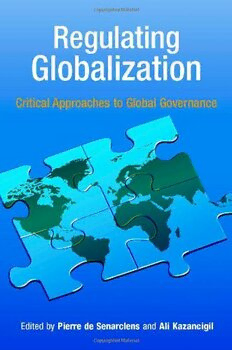
Regulating Globalization: Critical Approaches to Global Governance PDF
310 Pages·2007·1.311 MB·English
Most books are stored in the elastic cloud where traffic is expensive. For this reason, we have a limit on daily download.
Preview Regulating Globalization: Critical Approaches to Global Governance
Description:
The authors of this book offer critical historical and forward-looking analyses on current global governance and formulate proposals towards achieving a more accountable and transparent, participatory global governance system, together with an institutional architecture for regulating globalization that combines economic efficiency and social equity. A central argument in the volume is that the legitimacy of global governance is weak, and the way to make it more legitimate is to enhance the participation of State and nonState agents, give a strong role to statehood and democratic politics, and priority to public interest over private/corporate interests in global governance.
See more
The list of books you might like
Most books are stored in the elastic cloud where traffic is expensive. For this reason, we have a limit on daily download.
